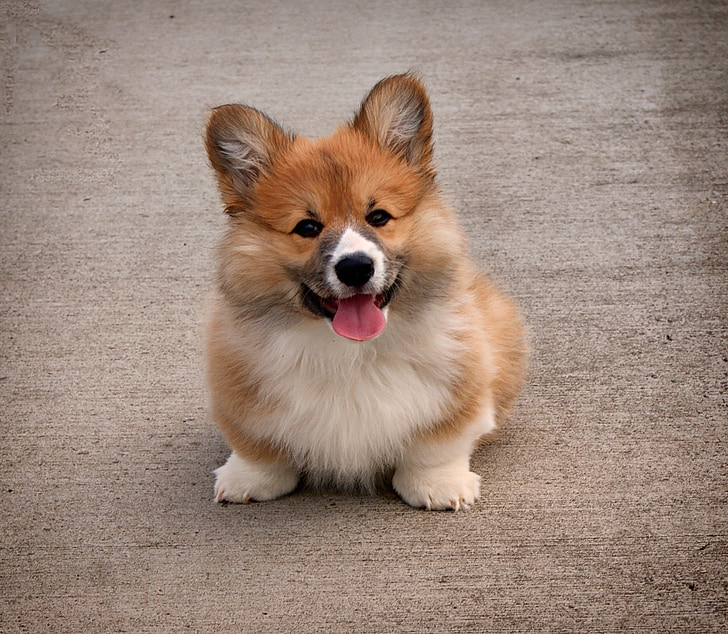The Pembroke Welsh Corgi, a breed distinguished by its short stature, strong build, and intelligent expression, stands as a symbol of enduring canine companionship. Originating from Pembrokeshire, Wales, this breed has garnered acclaim not only for its herding prowess but also for its role as a beloved family pet. Characterized by their quick intelligence and agile nature, Pembroke Welsh Corgis possess a remarkable ability to adapt to various environments, making them suitable for both rural and urban settings. Their compact size belies a robust constitution and spirited demeanor, traits that have endeared them to dog enthusiasts worldwide. As we delve into the world of Pembroke Welsh Corgis, we uncover the unique aspects that make this breed a cherished addition to many households.
Key Takeaways
- Pembroke Welsh Corgis are active and intelligent dogs that thrive in various living situations, but they require regular exercise to stay healthy and happy.
- Regular vet check-ups and a proper diet are crucial for a Corgi’s health, given their predisposition to certain genetic conditions.
- When living with a Corgi, it’s important to provide both physical and mental stimulation to keep them engaged and prevent boredom.
- Prospective Corgi owners should seek reputable breeders or consider adoption from rescue organizations to ensure they’re getting a healthy, well-socialized pet.
- Understanding the breed’s characteristics and needs can help ensure a happy and harmonious relationship between Corgis and their owners.
- Engaging in activities like agility training or herding can be a fun way to bond with your Corgi and tap into their natural instincts.
Breed Overview
History
Pembroke Welsh Corgis trace their lineage back to Pembrokeshire, Wales. They have a storied past as herding dogs, adept at guiding cattle and sheep through the rugged landscapes of Wales. Their intelligence and agility made them indispensable to farmers.
Beyond their working roots, these corgis gained royal popularity. Queen Elizabeth II’s affection for the breed elevated their status globally. She has owned over 30 Pembroke Welsh Corgis during her reign, making them synonymous with British royalty.
Physical Characteristics
Pembroke Welsh Corgis boast a distinctive body structure. They are low-set, strong, and sturdy, designed for efficiency in herding tasks. Their short legs are not just a unique feature; they contribute significantly to the breed’s agility, allowing them to dart quickly around livestock.
The breed displays a variety of coat colors including red, sable, fawn, and black and tan. The double coat is crucial for protection against harsh weather conditions, highlighting the breed’s adaptability to various environments.
Personality and Temperament
Pembroke Welsh Corgis are known for their friendly and outgoing nature. Their intelligence shines through in how quickly they learn commands and tricks. However, they possess a strong-willed personality that can sometimes manifest as stubbornness.
They tend to be vocal dogs, often barking to alert their owners of anything unusual. This makes them excellent watchdogs despite their small size. Their alertness combined with a warm disposition towards family members makes them well-loved pets.

Health And Care
Common Health Issues
Pembroke Welsh Corgis are generally healthy, but like all breeds, they’re prone to certain health conditions. Hip dysplasia and degenerative myelopathy are two genetic conditions often seen in this breed. Owners should ensure their pets maintain a healthy weight to mitigate the risk of these issues.
Obesity can be a significant concern for Pembroke Welsh Corgis. Without the right diet and plenty of exercise, these dogs can easily gain weight. This extra weight puts more strain on their joints and can lead to health problems.
Regular veterinary check-ups are crucial for early detection of eye conditions and other potential health issues. These visits help keep your corgi in top shape.
Dietary Needs
A balanced diet is essential for keeping Pembroke Welsh Corgis at a healthy weight. Measuring food portions and limiting treats helps prevent obesity, which is a common problem in the breed.
Owners should consult with a veterinarian to get personalized dietary advice. This is especially important for puppies and senior dogs, as their nutritional needs differ from adult dogs.
Exercise Requirements
Daily physical activity is vital for Pembroke Welsh Corgis. It keeps them healthy and prevents boredom. A mix of activities, including walks, playtime, and herding games, suits their energetic nature well.
However, due to their short legs and potential joint issues, owners should be mindful not to overexert these dogs. Finding the right balance of activity is key to their well-being.
Grooming
The double coat of a Pembroke Welsh Corgi requires regular brushing to manage shedding. Frequent baths aren’t necessary but maintaining a clean coat without drying out their skin is important.
Nail trimming and dental care should not be overlooked in the grooming routine of a Pembroke Welsh Corgi. These practices contribute significantly to the overall health of the dog.
Living with a Pembroke Welsh Corgi
Training and Socialization
Pembroke Welsh Corgis are smart. This makes them easy to train but also a bit stubborn. It’s key to start training early. Use treats and praise to encourage them. This method works wonders.
ializing them as puppies is crucial. They need to meet different people and animals. This helps them become friendly adults. Without this, they might become shy or nervous around strangers.
Environment
These dogs do well in many homes, including apartments. They need regular exercise, though. A daily walk and some playtime are enough to keep them happy.
A yard is great for a Corgi, but it must be secure. They love exploring and might try to escape otherwise. Also, they don’t like being alone for too long. They thrive on companionship. Leaving them alone often can lead to unwanted behaviors.
Activities They Enjoy
Corgis have lots of energy and are quite clever. Herding trials or agility sports are perfect for them. These activities challenge their minds and bodies.
Interactive games and puzzles can also keep them busy indoors. These stimulate their brains, keeping boredom at bay.
Regular play sessions are important too. Toys that they can chase or tug on help bond with their owners while getting the exercise they need.

Breeder Advice and Adoption
Choosing a Breeder
When you decide to welcome a Pembroke Welsh Corgi into your family, finding a reputable breeder is crucial. These breeders prioritize the health and well-being of their dogs. They perform necessary health screenings and provide clearances for common genetic conditions. This ensures you’re bringing home a healthy, happy family pet.
It’s wise to ask for references from past customers. This helps gauge the breeder’s reliability and the quality of their dogs. Moreover, visiting the breeding site offers insights into the puppies’ living conditions and how they’re cared for. Observing interactions between the breeder and their dogs can tell you a lot about the operation’s ethics.
Discussing the puppy’s lineage is also important. It gives you an idea of potential health issues or temperament traits. A good breeder will be transparent about their breeding practices and the history of the puppy’s parents.
Adoption
Adoption is another heartwarming way to find a Pembroke Corgi or Pembroke Welsh Corgi looking for a forever home. Shelters and rescue organizations often have Corgis that need new families. Adopting an adult dog has its perks, like skipping the challenging puppy stage. Plus, many adult dogs already have basic training.
The benefits of adopting include knowing your future pet’s temperament upfront and contributing to solving the problem of homeless pets. When considering adoption, it’s essential to inquire about the dog’s history, health status, and temperament. Rescue organizations usually have detailed records that can help match you with the right dog.
Asking detailed questions ensures you’re prepared for any special care your new friend might need. Whether it’s understanding their dietary needs or managing any existing health conditions, being informed helps create a smooth transition for both you and your new Corgi.
Top Dog Grooming Tools (Click Here)
Final Remarks
The Pembroke Welsh Corgi stands out as a breed with distinct characteristics, health considerations, and living requirements that potential owners should carefully consider. They require diligent care, regular veterinary check-ups, and an environment that caters to their energetic nature. Choosing a reputable breeder or considering adoption can significantly impact the well-being of these dogs. It’s crucial for prospective owners to weigh these factors thoroughly before deciding to welcome a Corgi into their home. This breed’s loyalty, intelligence, and affectionate nature make it a beloved companion for those who are well-prepared to meet its needs.
For those intrigued by the Pembroke Welsh Corgi, taking the next step involves reaching out to breeders or local rescue organizations dedicated to this breed. Engaging with communities of Corgi enthusiasts can also provide invaluable insights and support for both new and experienced dog owners. Ultimately, the joy of living with a Corgi comes from understanding and embracing all aspects of their care and companionship.
Frequently Asked Questions
What is the life expectancy of a Pembroke Welsh Corgi?
Pembroke Welsh Corgis typically live between 12 to 15 years. Proper care and regular veterinary check-ups can contribute to a longer, healthier life.
How much exercise does a Pembroke Welsh Corgi need?
A Pembroke Welsh Corgi requires daily physical activity and mental stimulation. Aim for at least an hour of exercise per day, including walks and play sessions.
Are Pembroke Welsh Corgis good with children?
Yes, Pembroke Welsh Corgis are known for being affectionate and patient with children. However, as with any dog breed, supervision during interactions is recommended.
What are common health issues in Pembroke Welsh Corgis?
Common health issues include hip dysplasia, degenerative myelopathy, and eye disorders. Regular vet visits and genetic testing of breeding dogs can help manage these risks.
Can Pembroke Welsh Corgis live in apartments?
Pembroke Welsh Corgis can adapt to apartment living if they receive sufficient daily exercise and mental stimulation to prevent boredom and destructive behavior.
What should I look for in a reputable Pembroke Welsh Corgi breeder?
Look for breeders who conduct health screenings on their breeding dogs, provide health guarantees for puppies, and are transparent about their breeding practices. Reputable breeders prioritize the well-being of their dogs over profit.
Is it better to adopt a Pembroke Welsh Corgi from a breeder or rescue?
Both options have benefits. Adopting from a breeder allows access to the dog’s genetic history, while rescuing offers a home to a dog in need. Consider your circumstances and preferences when deciding.






0 Comments